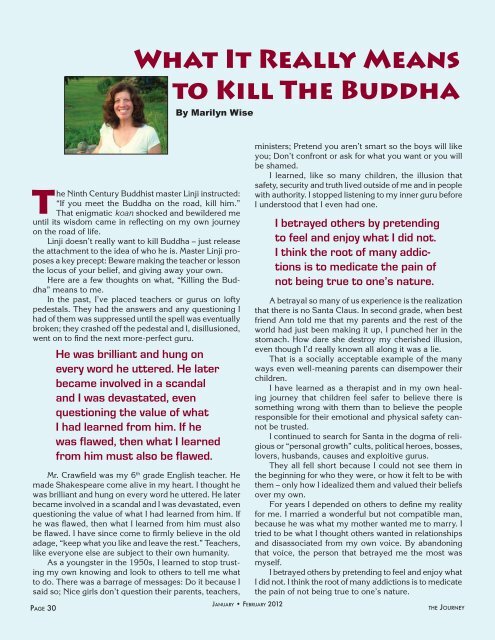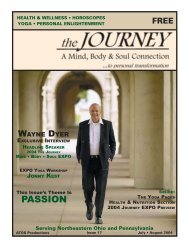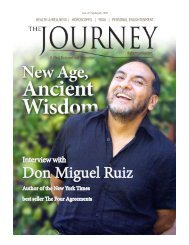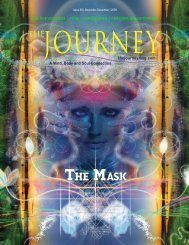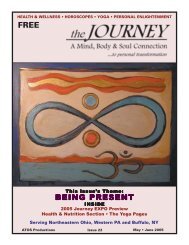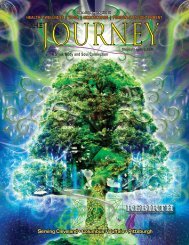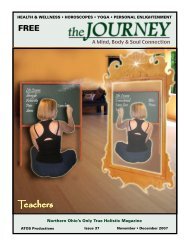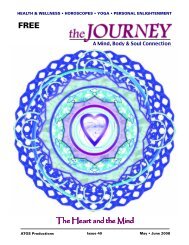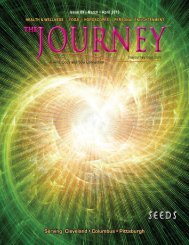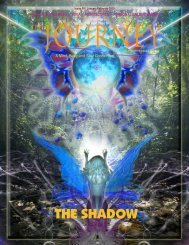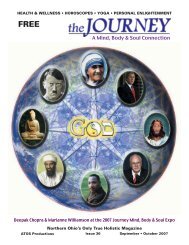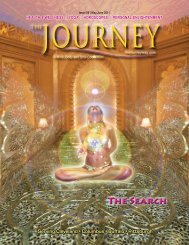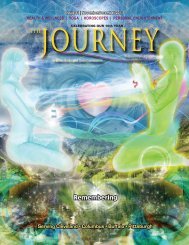Gurus - The Journey Magazine
Gurus - The Journey Magazine
Gurus - The Journey Magazine
Create successful ePaper yourself
Turn your PDF publications into a flip-book with our unique Google optimized e-Paper software.
What It Really Means<br />
to Kill <strong>The</strong> Buddha<br />
By Marilyn Wise<br />
he Ninth Century Buddhist master Linji instructed:<br />
“If you meet the Buddha on the road, kill him.”<br />
That enigmatic koan shocked and bewildered me<br />
Tuntil its wisdom came in reflecting on my own journey<br />
on the road of life.<br />
Linji doesn’t really want to kill Buddha – just release<br />
the attachment to the idea of who he is. Master Linji proposes<br />
a key precept: Beware making the teacher or lesson<br />
the locus of your belief, and giving away your own.<br />
Here are a few thoughts on what, “Killing the Buddha”<br />
means to me.<br />
In the past, I’ve placed teachers or gurus on lofty<br />
pedestals. <strong>The</strong>y had the answers and any questioning I<br />
had of them was suppressed until the spell was eventually<br />
broken; they crashed off the pedestal and I, disillusioned,<br />
went on to find the next more-perfect guru.<br />
Pa g e 30<br />
He was brilliant and hung on<br />
every word he uttered. He later<br />
became involved in a scandal<br />
and I was devastated, even<br />
questioning the value of what<br />
I had learned from him. If he<br />
was flawed, then what I learned<br />
from him must also be flawed.<br />
Mr. Crawfield was my 6 th grade English teacher. He<br />
made Shakespeare come alive in my heart. I thought he<br />
was brilliant and hung on every word he uttered. He later<br />
became involved in a scandal and I was devastated, even<br />
questioning the value of what I had learned from him. If<br />
he was flawed, then what I learned from him must also<br />
be flawed. I have since come to firmly believe in the old<br />
adage, “keep what you like and leave the rest.” Teachers,<br />
like everyone else are subject to their own humanity.<br />
As a youngster in the 1950s, I learned to stop trusting<br />
my own knowing and look to others to tell me what<br />
to do. <strong>The</strong>re was a barrage of messages: Do it because I<br />
said so; Nice girls don’t question their parents, teachers,<br />
Ja n u a r y • Fe b r u a r y 2012<br />
ministers; Pretend you aren’t smart so the boys will like<br />
you; Don’t confront or ask for what you want or you will<br />
be shamed.<br />
I learned, like so many children, the illusion that<br />
safety, security and truth lived outside of me and in people<br />
with authority. I stopped listening to my inner guru before<br />
I understood that I even had one.<br />
I betrayed others by pretending<br />
to feel and enjoy what I did not.<br />
I think the root of many addictions<br />
is to medicate the pain of<br />
not being true to one’s nature.<br />
A betrayal so many of us experience is the realization<br />
that there is no Santa Claus. In second grade, when best<br />
friend Ann told me that my parents and the rest of the<br />
world had just been making it up, I punched her in the<br />
stomach. How dare she destroy my cherished illusion,<br />
even though I’d really known all along it was a lie.<br />
That is a socially acceptable example of the many<br />
ways even well-meaning parents can disempower their<br />
children.<br />
I have learned as a therapist and in my own healing<br />
journey that children feel safer to believe there is<br />
something wrong with them than to believe the people<br />
responsible for their emotional and physical safety cannot<br />
be trusted.<br />
I continued to search for Santa in the dogma of religious<br />
or “personal growth” cults, political heroes, bosses,<br />
lovers, husbands, causes and exploitive gurus.<br />
<strong>The</strong>y all fell short because I could not see them in<br />
the beginning for who they were, or how it felt to be with<br />
them – only how I idealized them and valued their beliefs<br />
over my own.<br />
For years I depended on others to define my reality<br />
for me. I married a wonderful but not compatible man,<br />
because he was what my mother wanted me to marry. I<br />
tried to be what I thought others wanted in relationships<br />
and disassociated from my own voice. By abandoning<br />
that voice, the person that betrayed me the most was<br />
myself.<br />
I betrayed others by pretending to feel and enjoy what<br />
I did not. I think the root of many addictions is to medicate<br />
the pain of not being true to one’s nature.<br />
t h e Jo u r n e y


